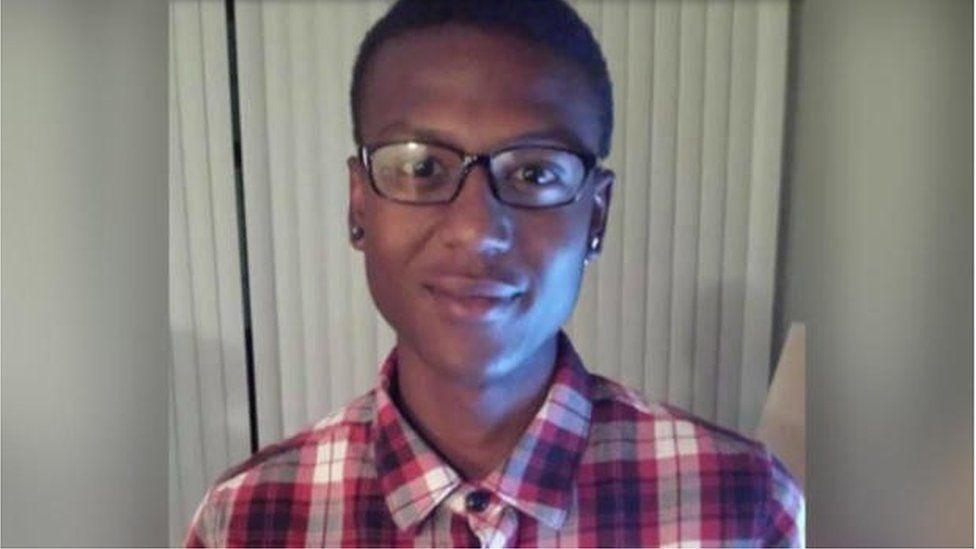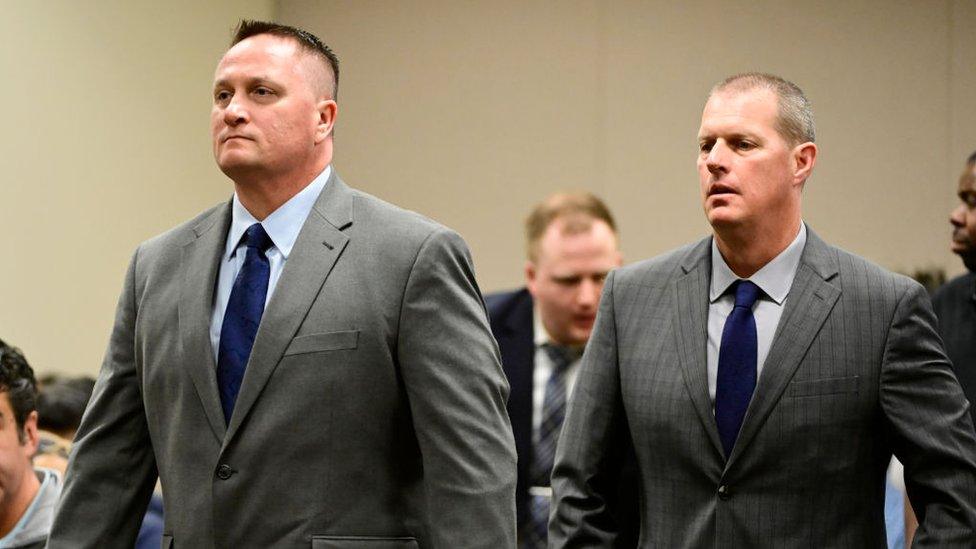Elijah McClain: Paramedics found guilty in death of Colorado man
- Published

Elijah McClain died after police put him in a chokehold and a medic injected him with ketamine
Two paramedics who injected Elijah McClain with an overdose of a sedative after police put him in a chokehold have been convicted of his 2019 death.
In a rare prosecution of medical personnel, a jury found Jeremy Cooper and Peter Cichuniec guilty of criminally negligent homicide.
It was the last trial against police and paramedics charged in the killing of Mr McClain, 23, in Aurora, Colorado.
The case of the young black man initially received little attention.
But it faced fresh scrutiny a year later after George Floyd's death in Minnesota sparked nationwide racial justice protests against police brutality.
The mostly white jury returned their verdict on Friday against Cooper and Cichuniec after two days of deliberations.
They also convicted Cichuniec of second-degree assault, but cleared Cooper of assault.
According to the Denver Post, external, Mr McClain's mother, Sheneen McClain, raised her fist in the air as she left court and called out: "We did it!"
"They cannot blame their job training for their indifference to evil or their participation in an evil action," she had written in a statement before the verdict.
"That is completely on them. May all of their souls rot in hell when their time comes."
Cooper's wife wept as courtroom officers moved to handcuff her husband, according to reporters in court.
Mr McClain had been walking home from a convenience store when he was stopped by three police officers responding to a call about a "sketchy" individual in the area.

Jeremy Cooper and Peter Cichuniec could face years in prison
At the time of the incident, on 24 August 2019, he was wearing headphones and a balaclava to protect himself from chronic chills caused by anaemia, his family has said. Mr McClain initially ignored the officers' commands to stop.
He was placed in a chokehold during the confrontation that followed. Bodycam footage of the incident shows him repeatedly telling officers: "I can't breathe."
Mr McClain is also heard pleading with the officers: "I'm an introvert and I'm different."
After he was restrained, Cooper and Cichuniec injected him with ketamine, a powerful sedative. He never regained consciousness and died after being removed from life support three days later.
Defence lawyers argued the two paramedics had followed their training in administering the sedative after diagnosing Mr McClain with "excited delirium".
Prosecutors said the paramedics had failed to conduct basic medical checks on Mr McClain, before injecting him with the maximum dose of ketamine.
They had also left him lying on the ground, making it difficult to breathe, and had failed to monitor his condition.
Three officers held Mr McClain up against a wall during the incident. In bodycam footage, Mr McClain can be heard saying: "I intend to take my power back."
One of the policemen is then heard saying: "He just grabbed your gun, dude."
But it is unclear from the dark and jerky footage whether Mr McClain tried to grab any officer's firearm, as lawyers for the policemen maintained, and prosecutors said that had never happened.
Two officers involved in the incident, Nathan Woodyard and Jason Rosenblatt, were acquitted of charges in November and October, respectively.
A third officer, Randy Roedema, was found guilty in October of criminally negligent homicide and third-degree assault. Prosecutors in that case argued that his statement that Mr McClain was "definitely on something" had contributed to the paramedics' decision to inject him with ketamine.
Roedema is due to be sentenced in January.
The city of Aurora in 2021 agreed to pay $15m (£12m) to settle a lawsuit brought by Mr McClain's parents.